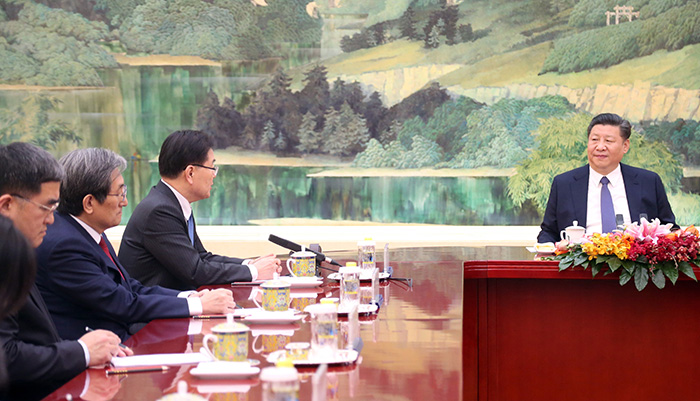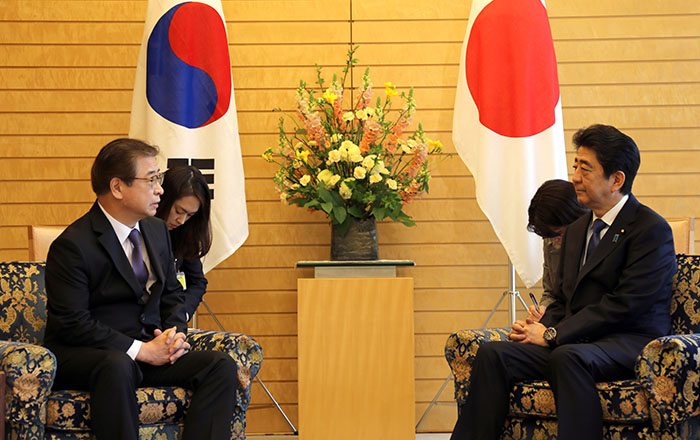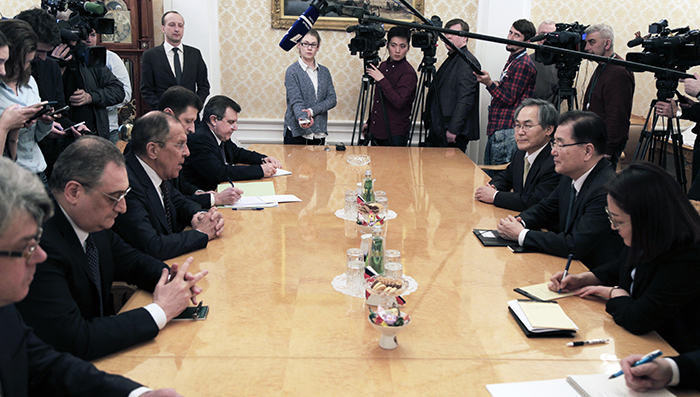News
Special delegates report back on visits to China, Japan, Russia
Mar 16,2018
Chief of the National Security Office Chung Eui-yong (third from left) briefs Chinese President Xi Jinping in Beijing on March 12 on the latest results of the presidential special delegation's trip to North Korea and to the U.S. This could potentially lead to a series of talks between South and North Korea and between the U.S. and the North.
By Sohn JiAe
Photos = Yonhap News
President Moon Jae-in has asked for follow-up measures after being briefed by the presidential special delegation that went to North Korea on its latest visits to China, Japan and Russia.
On March 15 in a meeting with Chief of the National Security Office Chung Eui-yong and National Intelligence Service (NIS) chief Suh Hoon, who recently traveled around the region to explain the potential outcomes of an inter-Korean summit and of talks between the U.S. and the North, President Moon asked that a preparation committee for the expected inter-Korean summit be run effectively and also called for efforts to draw support for the upcoming talks not only from neighboring countries, but also from the whole world.

National Intelligence Service chief Suh Hoon (left) updates Japanese Prime Minister Shinzo Abe on the expected summits between two Koreas and between the U.S. and North Korea, in Tokyo on March 13.
The head of the delegation, Chung, met Chinese President Xi Jinping in Beijing on March 12 and then held a series of talks with high-ranking Russian officials, including Minister of Foreign Affairs Sergey Lavrov, on March 13 and 14.
According to Cheong Wa Dae, President Xi told Chung that, “China, as a close neighbor to South Korea, fully supports the way in which efforts to improve inter-Korean ties and cooperation on reconciliation have been consistently made. Such efforts have made great progress on the overall situation across the Korean Peninsula, and have also made dialogue between Washington and Pyongyang possible. I look forward to the smooth development and good outcome of the expected inter-Korean summit. China, too, will join forces so that can come true.”
The Russian foreign minister said to Chung that the Russian government would fully support the two sets of talks with the North, and that it would maintain close cooperation with the South to ensure the talks are successful.
Japanese Prime Minister Shinzo Abe expressed his respect for President Moon’s leadership that has led to an improved inter-Korean relationship and to dramatic changes in the North’s denuclearization, in a meeting with the NIS chief on March 13.
“The current changes we face on the Korean Peninsula are the outcome of close trilateral cooperation among Korea, the U.S. and Japan,” said the Japanese prime minister. “In the face of two series of talks with Seoul and then with Washington, I don’t believe that Pyongyang would see these opportunities simply as ones to drag out the current situation,” he said, seemingly in a backlash against some skeptical opinions about the North’s overtures.

Chief of the National Security Office Chung Eui-yong (second from right) talks to Russian Minister of Foreign Affairs Sergey Lavrov (third from left) about the expected two sets of talks between the two Koreas and between the U.S. and North Korea, in Moscow on March 13.
Meanwhile, the newly-launched preparation committee for the expected inter-Korean talks announced after its first general meeting on March 16 that it would hold a meeting between high-ranking South and North Korean officials to facilitate the summit sometime in late March. It would also push forward performances in Pyongyang by South Korean entertainers and by a taekwondo demonstration team in early April. To discuss the Pyongyang shows, the government will hold a working-level meeting with the North at the Panmunjom truce village early next week.
Finally, the committee will appoint a panel of 30 to 40 advisory members, led by former Unification Minister Lim Dong-won, which will share its experiences of the two previous inter-Korean summits that took place in 2000 and 2007.
jiae5853@korea.kr